Choosing earrings goes beyond pure aesthetic taste. In this section, we will explore the ideal circumstances for opting for hypoallergenic earrings. Whether for special occasions or everyday wear, we will learn how to identify the symptoms of skin irritation and discover why it is crucial to choose the right option to maintain beauty without compromising comfort.
When to wear hypoallergenic earrings
Choosing earrings isn't just about complementing our outfit; for those with sensitive skin, it's also a matter of well-being. Here, we'll explore when it's essential to opt for hypoallergenic earrings and how to identify the symptoms of an allergic reaction.
Hypoallergenic earrings are ideal for everyday wear, especially if you have skin that is prone to allergic reactions. Constant exposure to irritating materials can trigger discomfort, making choosing skin-friendly jewelry essential to maintaining comfort throughout the day.
If you have experienced allergic reactions to jewelry in the past, it is advisable to always opt for hypoallergenic earrings. Prevention is key to avoiding discomfort and enjoying your accessories without worries.
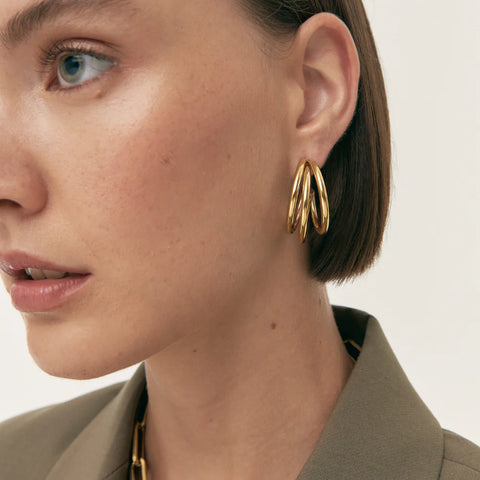
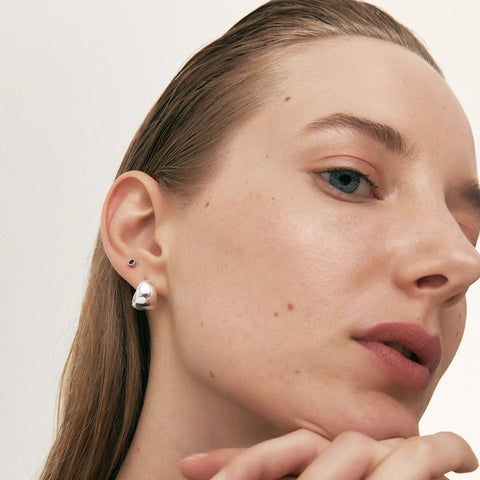
Symptoms for wearing hypoallergenic earrings
Symptoms of an Allergic Reaction to Earrings or Jewelry
Some common symptoms include itching, redness, inflammation, and in more severe cases, even peeling skin. If you experience any of these symptoms, it's likely that your earrings are not compatible with your skin.
Changes in the skin around the lobe
Pay attention to any changes in the skin around your earlobe. The appearance of small red bumps or a burning sensation are signs that your earrings may be triggering an allergic reaction.
Persistent discomfort or pain
If you experience constant discomfort or pain when wearing earrings, it could be indicative of an allergic reaction. In these cases, consider switching to hypoallergenic materials to ensure your jewelry doesn't compromise your comfort.
Opting for hypoallergenic earrings is not only a stylistic choice, but also an act of caring for your skin. At By Lia, we understand the importance of comfort without sacrificing elegance, offering you a wide range of jewelry designed to enhance your beauty without compromising your skin's well-being.
What materials are considered hypoallergenic:
Proper material selection is critical when it comes to hypoallergenic jewelry. By Lia is committed to offering pieces that are not only visually appealing, but also kind to even the most sensitive skin. Below, we'll explore some materials that are considered hypoallergenic:
1. 14- and 18-karat gold: High-purity gold, such as 14- or 18-karat gold, is less likely to cause allergic reactions. Avoid alloys containing nickel, as this metal can trigger allergies in some people.
2. Sterling Silver: Sterling silver, composed primarily of silver and copper alloys, is another hypoallergenic option. Make sure it is marked with the "925" stamp to ensure its authenticity and quality.
3. Titanium: Titanium is a lightweight and durable metal that has gained popularity in hypoallergenic jewelry. Its non-reactive nature makes it a safe choice for those prone to skin irritations, as well as being resistant to corrosion.
4. Surgical Stainless Steel: Surgical stainless steel is strong, durable and less likely to cause allergic reactions. It is an excellent choice for everyday jewelry as it retains its shine and strength over time.
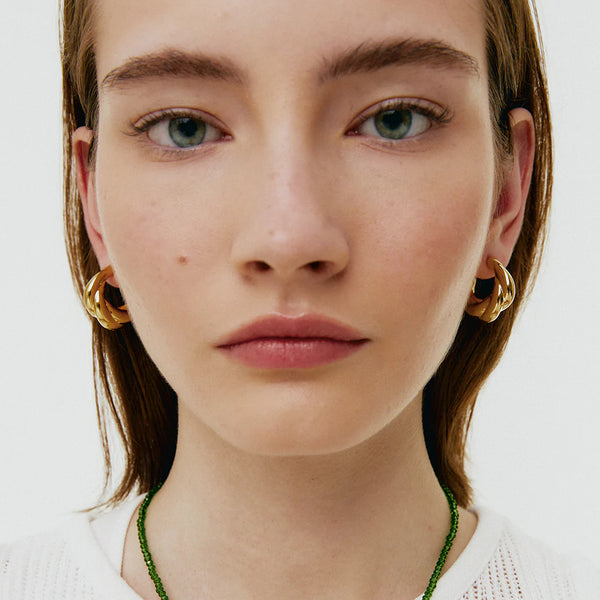
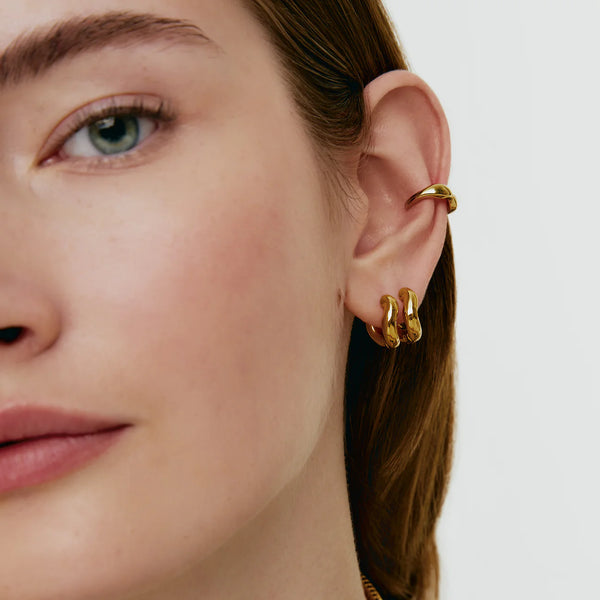
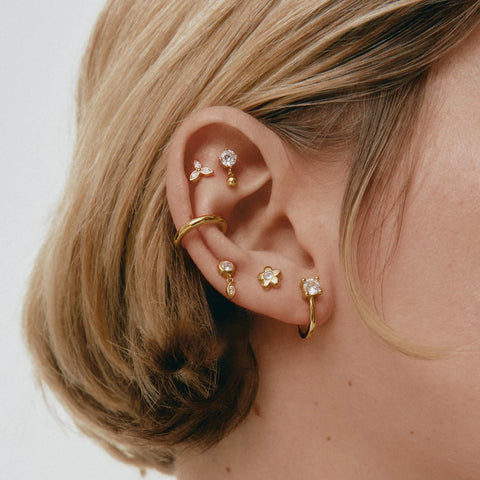
Hypoallergenic or antiallergic earrings, are they the same?
Terminology in the jewelry world can often lead to confusion, and the words “hypoallergenic” and “anti-allergy” are sometimes used interchangeably. However, it is crucial to understand that there are subtle differences between the two terms.
1. Hypoallergenic: The term "hypoallergenic" implies that a material or product has a low likelihood of triggering an allergic reaction. In the context of earrings, this means that the material used is designed to minimize the chance of skin irritation. Hypoallergenic earrings are ideal for people with sensitive or allergy-prone skin.
2. Anti-allergy: “Anti-allergy” refers to the ability to prevent or minimize allergic reactions. In the context of earrings, this implies that the material used is specifically designed to avoid triggering skin allergies. Anti-allergy earrings are formulated to be tolerated by most people, even those with a significant propensity for allergies.
Important recommendations for choosing hypoallergenic earrings:
When choosing hypoallergenic earrings, it is essential to consider certain aspects to ensure both the aesthetics and the health of your ears. Here are some important recommendations:
1. Avoid buying costume jewellery from clothing stores: Clothing stores often offer attractive accessories at tempting prices, but the quality of the materials can be dubious. Avoid costume jewellery of unknown origin, as it often contains alloys that could trigger allergic reactions. Opt for specialist jewellery stores, where the quality and safety of the materials are a priority.
2. Choose Stores with Good Reviews: Before making a purchase, do your research and choose stores with good customer reviews. Other shoppers' experiences can give you valuable insight into product quality and customer service. By Lia is proud to have over 600 positive reviews, with a score of 4.6 out of 5, which support our customers' satisfaction, ensuring a trustworthy and pleasant shopping experience.
3. Consult with the Customer Service Team: If you have any questions about the materials used in the earrings or need personalized advice, do not hesitate to contact the store's customer service team. Responsive and knowledgeable customer service can provide you with specific details about materials, manufacturing processes, and personalized recommendations, ensuring that you make informed and satisfying decisions.
4. Check Material Information: Before making a purchase, make sure the store provides detailed information about the materials used in their earrings. Look for terms like “hypoallergenic,” “nickel-free,” and “safe for sensitive skin” to ensure the products meet the standards you’re looking for. At By Lia, we offer transparency in the composition of our jewelry, giving you the confidence to make your choice.
5. Consider Certified Materials: Some materials, such as 14- or 18-karat gold, may have certifications that support their quality and purity. By choosing jewelry with certified materials, you can rest assured that you are investing in products that meet specific industry standards.
By following these recommendations, you can be sure that you are making informed and conscious decisions when choosing your hypoallergenic earrings. At By Lia, we strive to offer quality products that reflect our dedication to the satisfaction and well-being of our customers.
